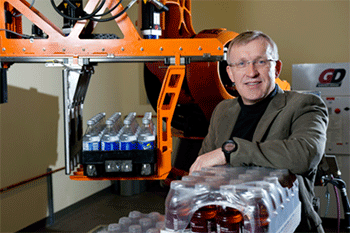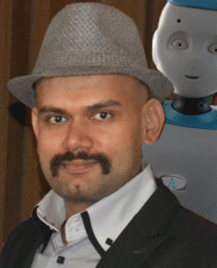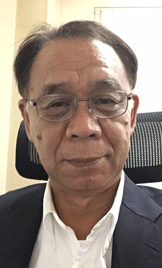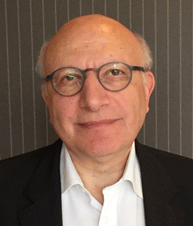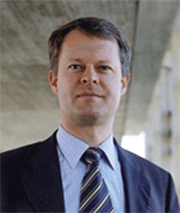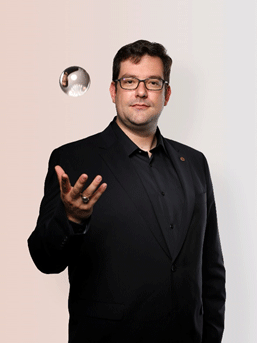 |
||||||||||||||||||||||||||||
| 2nd IEEE IROS Futurist Forum | ||||||||||||||||||||||||||||
| Sustainable Robotics for Humanity – Discussing and Shaping the Future TOGETHER | ||||||||||||||||||||||||||||
| Full-day Forum | ||||||||||||||||||||||||||||
| Date: Tuesday, October 11, 2016 | ||||||||||||||||||||||||||||
| Time: 10:15 am – 06:10 pm | ||||||||||||||||||||||||||||
| Location: Room 301, DCC (Daejeon Convention Center) | ||||||||||||||||||||||||||||
| Organizer: Dominik B.O. Boesl, Technische Universität München & KUKA AG | ||||||||||||||||||||||||||||
For the second time, globally renowned experts (including Henrik Christensen, Linda Bernardi [former Chief Innovation Officer IBM Corp.] and others) share their holistic and interdisciplinary view on the future and impact of robotics, automatization, A.I. and other disruptive technologies on the world of tomorrow. They engage in fact-based discourse with the audience and together with you – a diverse group of stakeholders – we will lay the foundation for the development of commonly accepted guidelines and frameworks on the way to voluntary self-regulation: Robotic Governance. |
||||||||||||||||||||||||||||
Goals: involve stakeholders – spark discourse – launch topic/interest groups – publish results of this and last year's Futurist Forum – define and publish Robot Manifesto |
||||||||||||||||||||||||||||
Contact: roboticgovernance.com - info@roboticgovernance.com - @robogovernance - #RoboticGovernance – facebook.com/roboticgovernance.com – robotmanifesto.org |
||||||||||||||||||||||||||||
Background: Robotics will change the world! It will unleash the same if not an even more disruptive and transformational power within the next 50 years as mainstream IT-technology and the Internet have over the last half a century. Nurtured by technological breakthroughs in industrial automation, robotics will exhaustively permeate all domains of the human living realm. |
||||||||||||||||||||||||||||
| Agenda: | ||||||||||||||||||||||||||||
|
||||||||||||||||||||||||||||
| Keynote: | ||||||||||||||||||||||||||||
| Manufacturing in a non-flat world | ||||||||||||||||||||||||||||
| Over the last few decades we have seen tremendous progress on materials, processes and material handling. At the same time the world is going towards an extreme degree of customization. Already today most cars are available in millions of different configurations. We see electronics that have a product life time of months. The trend is likely to continue and at the same time integrated manufacturing will allow for a highly distributed factory where transport over extended distances will pose a major challenge. We have already started to see this with re-shoring efforts. The future of manufacturing will see tight coupling between design, fabrication, delivery and full life-cycle considerations. In this presentation we will present key driver for change and discuss the integration of fabrication across all aspects of the life-cycle. | ||||||||||||||||||||||||||||
|
||||||||||||||||||||||||||||
| He has published more than 350 contributions across AI, robotics and vision. His research has a strong emphasis on "real problems with real solutions". A problem needs a theoretical model, implementation, evaluation, and translation to the real world. He is actively engaged in the setup and coordination of robotics research in the US (and worldwide). Dr. Christensen received the Engelberger Award 2011, the highest honor awarded by the robotics industry. He was also awarded the "Boeing Supplier of the Year 2011" with 3 other colleagues at Georgia Tech. Dr. Christensen is a fellow of American Association for Advancement of Science (AAAS) and Institute of Electrical and Electronic Engineers (IEEE). He recieved an honorary doctorate in engineering from Aalborg University 2014. He collaborates with institutions and industries across three continents. His research has been featured in major media such as CNN, NY Times, BBC, ... | ||||||||||||||||||||||||||||
| Sessions: | ||||||||||||||||||||||||||||
| Session 1a: Robotics & AI Today – reality vs myth | ||||||||||||||||||||||||||||
| Let's level set first! How has Robotics and AI evolved and what does the landscape look like today? How do we define AI today? Companies are rapidly trying to deploy Robotics in many different flavors (from the very commercial) to the academics to cobots and other. What is myth, what is real and how can we assure the success of Robotics today. What is myth vs reality? What are the key disruptions that we are seeing and how should we manouver this space? What are the global social and moral considerations of Robotics today? We will end this session with hints about the future of Robotics and all its considerations as we prepare for the afternoon session about the future of Robotics. | ||||||||||||||||||||||||||||
| Session 1b: Robotics and AI of the Future – How do make sure we do the right thing? And do so collaboratively and globally!yth | ||||||||||||||||||||||||||||
| As definitions of Robotics become wide and broad in the years to come and as we begin to see robotics and AI intermixed, combined by needing to operate in a fully collaborative (not singular) ecosystem, our considerations about the future of Robotics & AI evolves massively. What is the world of Robotics going to look like in 10, 20, 50 years? We need to think carefully about the moral, social and global considerations AND now do so 'collaboratively' as lines are going to be re-defined. What are the disruptions we should embrace, how to lead in order to innovate in the right direction in Robotics. In fact, what will be call Robotics and AI in the highly automated, machine learning and operating, deep learning, extremely connected and zero-human interaction world? This session will begin to explore that world. As we look at driverless connected cars totally running by machine learning without human intervention be called a robot – drones and many other technologies driven by technology without human intervention. How do we assure we are creating the 'best' future!. | ||||||||||||||||||||||||||||
|
||||||||||||||||||||||||||||
| Session 2: Robots, AI, Human, Society and Needs - Where are all these conversing? Towards Coexisting Socially Intelligent Robots of the Future! | ||||||||||||||||||||||||||||
| Human, Society and the Societal needs are evolving. AI has been with us for decades. Robots are starting to be part of our day-to-day environment. So, where are all these converging together? Towards creating a smarter eco-system of living, where robots will coexist with us in harmony, for a smarter, healthier, safer and happier life. How? Social Intelligence of such consumer Robots will be the key technology and the next big R&D challenge, for such robots to behave in socially expected and accepted manners. The talk will reinforce that the humanoid robots have a range of potential societal applications, and that as a robotics industry, SoftBank Robotics' R&D and Innovation is around the centrality of wellbeing of people. The time has arrived, when social robots have started to be deployed, evaluated and available for practical purposes outside automation industry. For example, Pepper robot from SoftBank Robotics, which is mass produced and already being used in thousands of homes, and at public places; the Romeo humanoid robot companion for everyday life of people needing assistance; the Nao robot as teaching assistant. The first part of the talk will illustrate some of the use cases and future applications for such intelligent humanoid robots, grounded with some European Projects. The second part will highlight some of the immediate R&D challenges from industrial perspective. The last part will present the feedback and needs from the real users and will conclude with some open and grand challenges ahead, including social and ethical issues. | ||||||||||||||||||||||||||||
|
||||||||||||||||||||||||||||
| Among other responsibilities, he is the founding coordinator of Socially Intelligent Robots and Societal Applications (SIRo-SA) Topic Group (TG) of euRobotics, and an active contributor in the Multi-Annual Roadmap (MAR) and Strategic Research Agenda (SRA) of euRobotics, which aim to shape the future of robotics in Europe in collaboration with European Commission (EC) through PPP SPARC (the largest civilian-funded robotics innovation programme in the world). He is also the recipient of Pravashi Bihari Samman Puruskar 2014 (Non Residential Bihari Honour Award), for Science, Technology and Education, one of the highest level civilian honors, awarded by the state of Bihar, India. | ||||||||||||||||||||||||||||
| Session 3: | ||||||||||||||||||||||||||||
|
||||||||||||||||||||||||||||
|
||||||||||||||||||||||||||||
| Session 4: The Global Initiative for Ethical Considerations in the Design of Autonomous Systems | ||||||||||||||||||||||||||||
| The GIECDAS initiative was launched by the IEEE Standards Association in April 2016. Its purpose is to ensure every technologist is educated, trained, and empowered to prioritize ethical considerations in the design and development of autonomous and intelligent systems. The Global Initiative is part of a broader IEEE effort on ethics in technology, which includes a new Ethics, Society & Technology Program focused on creating and expanding debates, dialogue and conversation so that all aspects of an ethics issue are examined. The Initiative brings together experts in fields relating to autonomous systems and their ethics, including robotics, artificial intelligence, computational intelligence, machine learning, deep learning, cognitive computing, affective computing, and, in general, algorithmically-based programs. Initiative members span fields that include engineering, law, science, economics, ethics, philosophy, politics, and health. They are organized in committees that identify ethical issues in different areas pertaining to autonomous and intelligent systems and provide recommendations and potential standardization projects regarding ethics for autonomous systems. |
||||||||||||||||||||||||||||
|
||||||||||||||||||||||||||||
| He is member of the CERNA, The French Ethics Committee on Research in Information Science and Technology and chair of the IEEE-SA Global Initiative for Ethical Considerations in the Design of Autonomous Systems. | ||||||||||||||||||||||||||||
| Session 5: An outlook for robotics in industry and service. | ||||||||||||||||||||||||||||
| The presentation will give a brief overview into statistics of robotics and will briefly look into the structure and growth of new industries being created, particularly in service robotics. Furthermore the mutual dependencies between IoT and robotics will be address as a major driver in robotics dissemination in all application sectors. | ||||||||||||||||||||||||||||
|
||||||||||||||||||||||||||||
| Organizer: | ||||||||||||||||||||||||||||
|
||||||||||||||||||||||||||||
| At TUM School of Education, he is researching "Technology & Robotic Governance": the ethical, moral, socio-cultural, -political and -economic implications of technologies, as robotics, automation and artificial intelligence on humankind. In order to foster the interdisciplinary discourse about the impact of robotics and automation on society and humankind, Dominik is driving the idea of "Robotic Governance", trying to establish a framework for voluntary self-regulation regarding the use of disruptive technologies. The corresponding initiative and discussion platform can be found at www.roboticgovernance.com. The current work on the "Robot Manifesto" can be found at www.robotmanifesto.org. He is also engaged in the IEEE RAS FDC Incubation Project on Autonomous Systems and their Societal Impact as well as in the euRobotics Topic Group on Ethical, Social and Legal Implications (ESL) of Robotics, influencing the input to the European roadmaps. Furthermore, Dominik organizes workshops on Technology and Robotic Governance at several conferences, like the IEEE GHTC Conference or the European Robotics Forum and is chairing the annual IEEE IROS Futurist Forum. In 1999, Dominik started his career at Siemens, where he helped establish the foundations of today's mobile ecosystem by bringing the first UMTS broadcasting cell to market, before joining Microsoft Germany in 2005. At Microsoft, he held various leadership positions including national responsibility in developer evangelism. Instead of moving to Seattle for a leadership position in program management at Microsoft Corporation, he decided to join the KUKA group. He is member of the IEEE Robotics and Automation Society Industrial Activities Board, acts as the IEEE/RAS representative in the IEEE Standards Association IoT Steering Committee and serves regularly as judge in innovation and start-up challenges like the IEEE/RAS & International Federation of Robotics (IFR) Invention and Entrepreneurship Award, the IEEE/RAS IROS Entrepreneurship Forum and Start-Up Contest and the European Space Agency's (ESA) Service Robotics Masters Start-up Award. In his spare time, he publishes educational concepts on serious gaming and works as head of a charity organization that maintains AntMe!, one of the world's most successful serious games. |
||||||||||||||||||||||||||||

Futurist Forum







